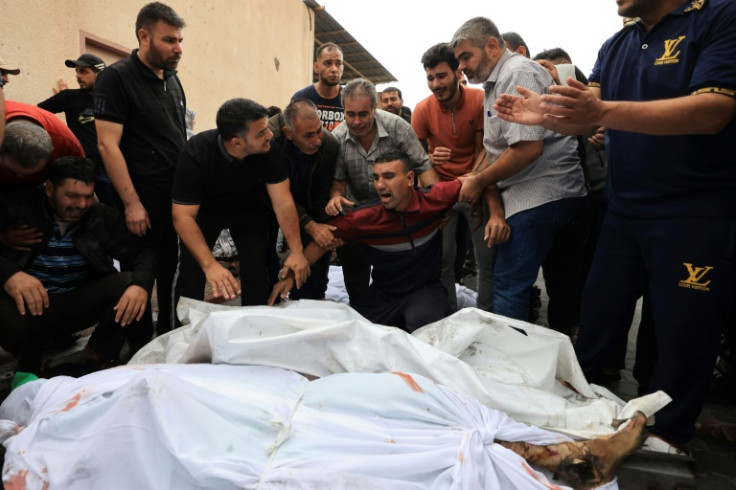Israel Order 'Total Blockade' On Gaza And Destroys 1,000 Hamas Targets After Death of 900 Israel
In retaliation for the mass murder of more than 900 Israeli nationals, Israel has cut off all food, water and electricity supplies in Gaza. In Gaza, more than 700 people have been killed in the air strikes.

In the last 48 hours, footage of people in Gaza celebrating the torture and mass killing of Israeli nationals, circulated on social media. Today, the situation in Gaza couldn't be more different.
After an unprecedented bombardment of missiles from Hamas, a pro-Palestinian militant organisation that has dominated Gaza since 2005, Israel formally declared war on Gaza and warned Palestinian nationals to evacuate the area.
In a televised speech, the right-wing Prime Minister of Israel, Benjamin Netanyahu told the residents of Gaza to "leave now" and warned: "We are at war, and we will win."
Israel carried out their retaliation with relentless missiles being fired into Gaza.
Reports from the Israeli Defence Force (IDF) claim that the army had destroyed more than 1,000 targets in Gaza.
The calculated shelling hit the homes of Hamas leaders, military positions, regions run by the group and the Watan Tower. The Watan Tower, which serves as an internet hub for people in Gaza, was struck by the IDF on Sunday morning.
Israel has also stopped supplying the region with electricity, leaving only 20 per cent of Gaza with power from its own supplier.
The Israeli authorities had warned that the brutal attack on Israeli civilians, which includes gang rapes, abduction, torture and the mass killing of more than 900 people, would not be dealt with lightly.
A look at what the Israeli army have done in the Gaza Strip in a very short time pic.twitter.com/VPdaPaYDsN
— Sprinter (@Sprinter99800) October 10, 2023
While world leaders attempt to de-escalate the conflict, Israel has since declared a "total blockade" on Gaza, cutting off all food and water supplies.
Health officials in the region have reported that more than 700 people have been killed in the retaliatory air strikes on Gaza. The UN also recalled that 187,000 Palestinians are now displaced after fleeing the area.
But with nowhere to go, many Palestinian nationals have been left to deal with the already dreadful humanitarian situation in Gaza getting worse.
Mahmoud Shalabi, the Director of the charity Medical Aid for Palestinians operating in Gaza, called the city's main hospital a "slaughterhouse".
Due to a lack of medical funding and an increasing number of patients, Shalabi added: "There were many dead bodies in the morgue and many medical staff were unable to cope with the huge influx of casualties they were receiving," he added.
Since being governed by Hamas, an organisation that is considered a terrorist group by dozens of countries across the globe, Gaza has developed an unemployment rate of 45 per cent.
More than 45 per cent of Gaza residents are children, meaning that 800,000 youths have never experienced life without Hamas or Israel's blockade – according to Save the Children.
The Lebanese Shia Islamist political party and militant group, better known as Hezbollah, has since certified its alliance with Hamas by announcing that it was "closely following the important developments in the Palestinian situation with great interest".
Hezbollah is backed by Iran and is also considered a terrorist organisation in several nations.
ISRAEL FESTIVAL REVELERS SHOT AT POINT-BLANK RANGE
— NVN (@NowVideoNetwork) October 10, 2023
Gaza militants who attacked an all-night music festival in southern Israel SHOT AND KILLED revelers at point-blank range, then looted their belongings.#IsraelPalestineWar #IsraelAtWar#IsraelUnderAttack #Gaza #غزة_الآن pic.twitter.com/9RF82ZOiYD
On Monday 10 October, the militant group accused Israel of killing at least three of its members in Gaza. The identified victims were identified as Hussam Mohammad Ibrahim, Ali Raef Ftouni and Ali Hassan Hodroj.
Adamant that Israel had conducted the assault, Hezbollah said that those who had been killed were "martyred as a result of the Zionist aggression on south Lebanon Monday afternoon".
With tensions between the IDF and Hezbollah on the up, the UK and the US have loudly announced their controversial standing with Israel.
During the strikes earlier today, Tuesday 10 October, the IDF announced that they had hit a Hamas military compound, a weapons storage site and a war room.
Hamas has continued to strike Israel since the unprecedented attack on Saturday and Sunday, but reports say that the iron dome has managed to intercept the rockets.
In the first three days of the war, a staggering 21,616 people in Israel were taken into hospitals across the country. Today, 544 Israeli nationals are currently hospitalised, with three people in critical condition.
© Copyright IBTimes 2025. All rights reserved.






















